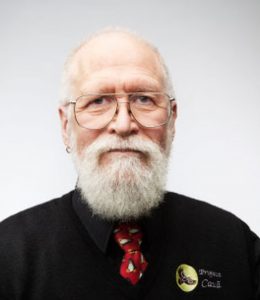Good news: Jon “Maddog” Hall confirms presence at FISL18
An already traditional presence in the FISL confirms the coming to Brazil again. Jon “Maddog” Hall became internationally known for being Director of the Board of the Linux Professional Institute. Today, he serves as CEO of OptDyn, creator of the p2p Subutai cloud software. He also works as an independent consultant to bring environmentally friendly computing resources to emerging markets. Maddog began his computer career in 1969, almost half a century ago, and has served as a programmer, systems designer, systems administrator, product manager, technical marketing manager, educator, and consultant.
At FISL18, Maddog will give three lectures. The dates and times will be confirmed in the next few days, but we are already here! Stay tuned to the event schedule grid to learn all the details.
The first activity will be entitled “Open Source Peer-to-Peer Cloud Software – making, saving and mining money” and talks about P2P systems for cloud computing as a way not to be completely dependent on large corporations such as Microsoft, Amazon, IBM and Google. It will introduce the open source software Sabutai, which in addition to providing control over its own information also allows the sale of computational resources that are left in its structure by digital tokens.
In the second activity, entitled “Open Education: Do I really need a university education in Computer Science and Engineering?”, Maddog will discuss the real need for an academic background to learn computing and ways to gain knowledge freely.
And in the third and final lecture, titled “The Half-Century of Unix / A Quarter Century of GNU / Linux and why it Matters,” the speaker will reflect on what all these temporal milestones in the history of programming and internet and how various fields of society are dealing with them.
Check out the full summaries of the lectures:
Lecture day 11 – probably at 10am
Title: Subutai: Open Source Peer-to-Peer Cloud Software – making, saving and mining money
Abstract: Most of what people call “the cloud” today are businesses run by large corporations, typically headquartered in the United States, and under United States law. These large companies (Microsoft, Amazon, IBM, Google) only want to sell you resources. They are not interested in buying resources from you, only selling resources to you. Subutai offers you an Open Source, Peer-to-Peer Cloud platform “PeerOS”, which uses the same lightweight Linux Containers (LXC) as other cloud vendors to allow you to set up your own secure, safe cloud, giving you control over your data and processing. In addition Subutai allows you to earn “GoodWill”, lightweight digital tokens, by selling or renting your unused computing resources to other people. You can also exchange GoodWill for KHAN, an Ethereum-based token soon to reach ICO. Finally OptDyn contributed the Subutai Blockchain Router design to the Caninos Loucos project at LSITEC, a secure broadband router/NAS Server/IoT Gateway that also efficiently mines cryptocurrencies. This router will be manufactured in Brazil and be sold in large quantities as of Q3CY18.
Lecture on the 12th – probably at 12 noon
Title: Open Education: Do I really need a university education in Computer Science and Engineering?
Abstract: Many times I have been asked if people need a university degree to do computer science or computer engineering. The short answer is “no”, but the longer answer is “perhaps”. This talk will discuss several ways you can effectively teach yourself these skills and how you can prepare for a job in the computer field.
Lecture day 14 – possibly 14h
Title: 2019: A Half-Century of Unix/A Quarter Century of GNU/Linux and why it matters
Abstract: Next year will be the fiftieth anniversary of Unix and the beginning of the Internet. Twenty five years later V1.0 of the Linux kernel shipped. Why were these (and other milestones) significant? Did the people who started these projects envision they would have the impact they did, or did they do it “just for fun”? What market needs were met by these systems? How close was the computer industry to M$-ageddon? Maddog will bring his unique perspective on these questions and more, as he recounts his half-century of programming, most of it with what we now call “Open Source”.
